Becoming an education powerhouse is the goal that Chinese leaders aim for in a newly announced plan, with the emphasis on 'opening up' to increase international cooperation.
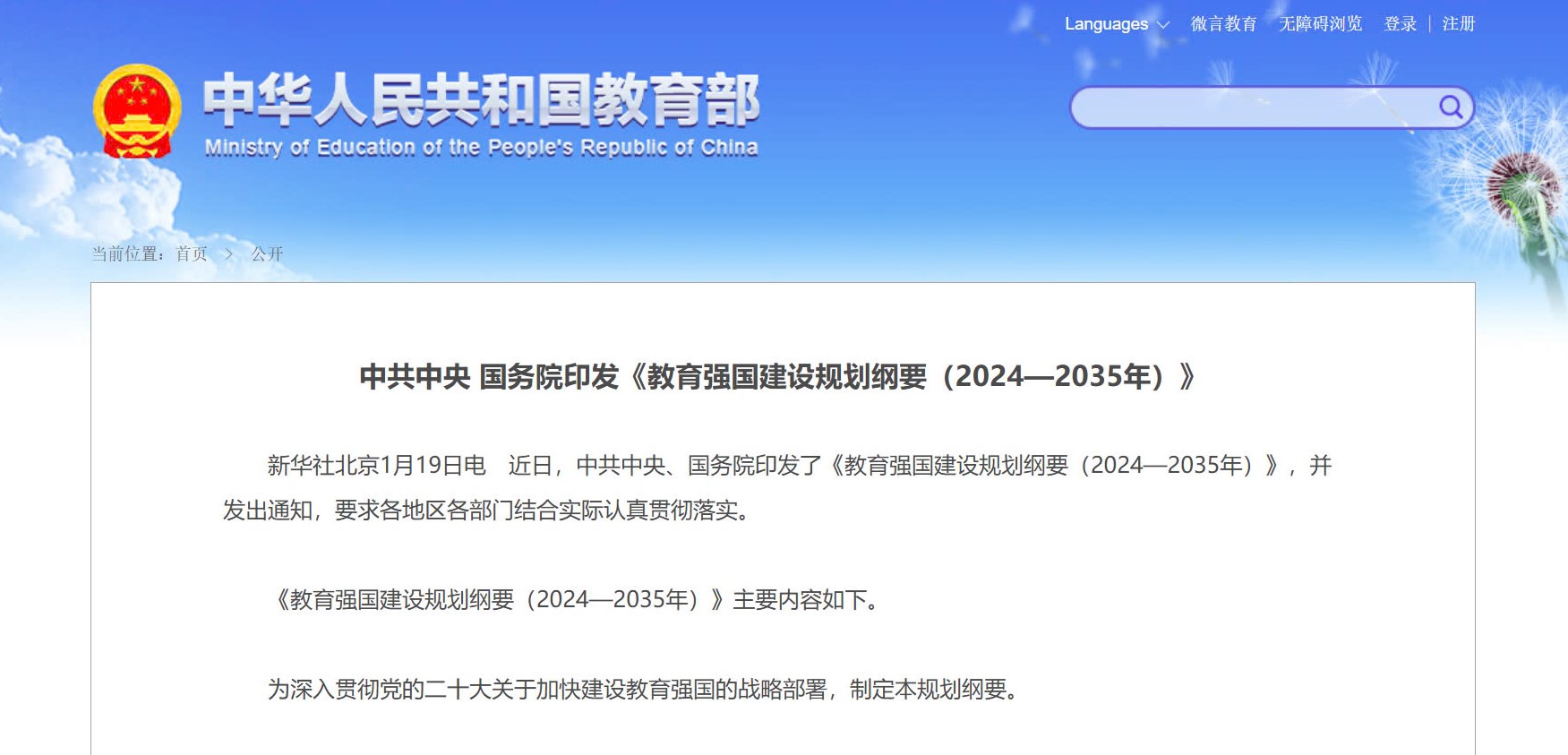
A new education plan aimed at becoming an education powerhouse was posted on the website of the Chinese Ministry of Education.
What it takes to become an educational powerhouse
The Communist Party of China (CPC) Central Committee and the State Council issued a new vision for education last weekend, called the "Planning Plan for Building an Education Powerhouse (2024-2035)." The document aims to realize the aspiration of building a leading education-based country with socialism with Chinese characteristics that can support national modernization and rejuvenation, according to Xinhua .
Specifically, the plan addresses various educational issues from personality and ideology education, general education, university education, vocational education, building a learning society, digitalizing education, and issues of scientific and technological research with a total of 38 different directives. The plan also sets out general requirements with annual goals, and at the same time, requests all parties to strengthen organization and implementation.
"Party committees and authorities at all levels need to seriously shoulder the political responsibility for building an educational powerhouse, put this on the important agenda, as well as implement this project on a practical basis. It is necessary to create an environment in which the whole society is interested in and supports the building of an educational powerhouse, strengthen propaganda and public opinion orientation, perfect the educational cooperation mechanism between schools, families and society, and form a combined strength to build an educational powerhouse," the document said.
The plan immediately attracted the attention of international media channels, as it was launched on the occasion of Donald Trump, a tough leader on China, taking office for a second term as US president. Meanwhile, China's new plan focuses on "opening up" its education system, such as encouraging prestigious foreign universities to offer training programs and establish research facilities in the country.
The new plan also shows that China intends to expand academic exchanges and international cooperation in education and scientific research, as well as support its universities to initiate or participate in major international research projects. China will also actively participate in global education governance, support domestic schools to establish academic alliances, create internationally influential scientific journals, etc., according to the plan.

Peking University campus, one of China's top higher education institutions
Reasons for issuing the new plan
Speaking to The PIE News , Mingze Sang, President of the Beijing Overseas Study Services Association (BOSSA), said the overarching goal of the plan is to strengthen and modernize China's education system, a system that many people are currently "unsatisfied with." "This includes limited access to domestic university education, forcing many families to consider sending their children to study abroad or study joint training programs," Sang said.
On the other hand, Mr. Hongqing Yang, CEO of Educationist Group (Hong Kong), commented that the new plan issued by the Chinese government is to "cope with the challenges facing the economy". "Therefore, China seeks to nurture domestic talent by opening its doors to foreign universities, especially when the country faces challenges in sending students to study abroad", Mr. Yang said.
"Just as the US slammed the door on China, China chose to open its door to the US," Simon Marginson, professor of higher education at Oxford University, told Times Higher Education . "China is behaving in the same way the US did, using open relations rather than confrontation and closure, to achieve its policy goals."
Previously, at the end of 2024, the Vietnamese Party and Government also launched and approved many policies related to education and technology, including Decision No. 1600/QD-TTg of the Prime Minister approving the Project on International Integration in Education and Training to 2030; Resolution No. 57-NQ/TW of the Politburo on breakthroughs in science, technology, innovation and national digital transformation; Decision No. 1705/QD-TTg of the Prime Minister approving the Education Development Strategy to 2030, with a vision to 2045.
Overall, the above policies have some similar goals to China's new plan, such as increasing the presence of prestigious foreign universities, increasing the number of international students, focusing on developing science and technology, promoting digital transformation or the aspiration to become an educational center... However, there are also many differences, such as the desire to make English the second language in schools.
"The resolution and new decisions show that the Government is creating favorable conditions for Vietnamese universities to cooperate with prestigious foreign partners in joint training activities, student exchanges, research, degree recognition, as well as creating conditions for foreign universities to establish branches in Vietnam," commented the British Council, an international organization for cultural cooperation and educational opportunities of the UK based in Hanoi and Ho Chi Minh City.
Source: https://thanhnien.vn/10-nam-nua-trung-quoc-muon-thanh-cuong-quoc-giao-duc-tren-toan-cau-185250126140322429.htm




![[Photo] Prime Minister Pham Minh Chinh receives Swedish Minister of International Development Cooperation and Foreign Trade](https://vphoto.vietnam.vn/thumb/1200x675/vietnam/resource/IMAGE/2025/5/12/ae50d0bb57584fd1bbe1cd77d9ad6d97)
![[Photo] Prime Minister Pham Minh Chinh works with the Standing Committee of Thai Binh Provincial Party Committee](https://vphoto.vietnam.vn/thumb/1200x675/vietnam/resource/IMAGE/2025/5/12/f514ab990c544e05a446f77bba59c7d1)
![[Photo] Prime Minister Pham Minh Chinh starts construction of vital highway through Thai Binh and Nam Dinh](https://vphoto.vietnam.vn/thumb/1200x675/vietnam/resource/IMAGE/2025/5/12/52d98584ccea4c8dbf7c7f7484433af5)



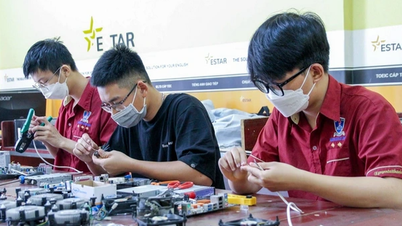

![[Photo] Explore the Great Wall of Water in the Suburbs of Beijing, China](https://vphoto.vietnam.vn/thumb/402x226/vietnam/resource/IMAGE/2025/5/5/c2e706533d824a329167c84669e581a0)










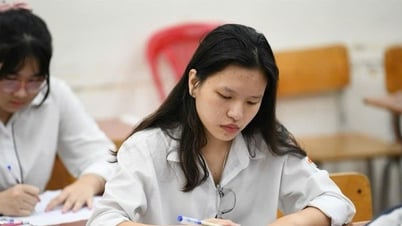

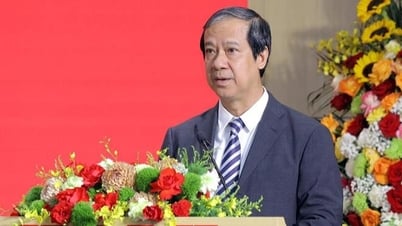









































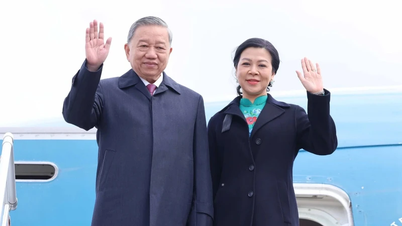
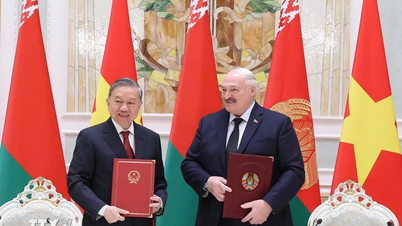
































Comment (0)